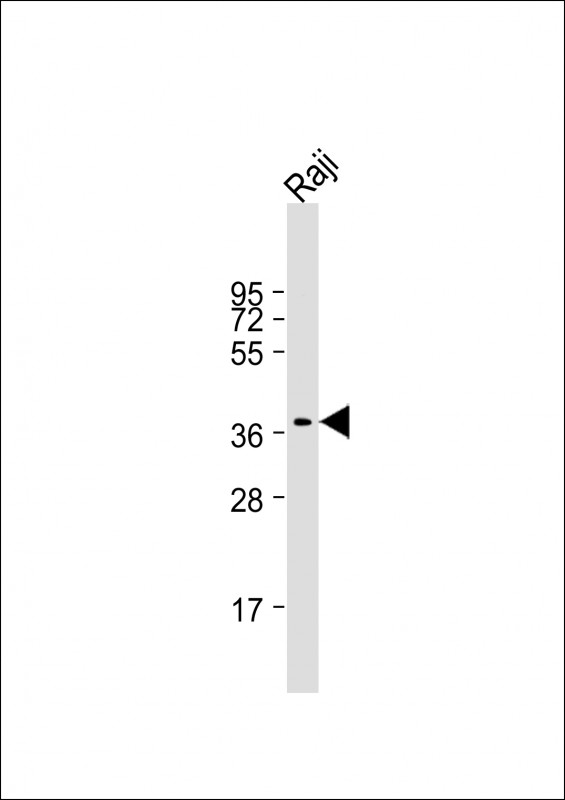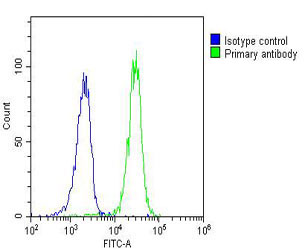

| WB | 1/2000 | Human,Mouse,Rat |
| IF | 咨询技术 | Human,Mouse,Rat |
| IHC | 咨询技术 | Human,Mouse,Rat |
| ICC | 技术咨询 | Human,Mouse,Rat |
| FCM | 1/25 | Human,Mouse,Rat |
| Elisa | 咨询技术 | Human,Mouse,Rat |
| Aliases | Ras association domain-containing protein 2, RASSF2, KIAA0168 |
| Entrez GeneID | 9770 |
| WB Predicted band size | 37.8kDa |
| Host/Isotype | Mouse IgG2a |
| Antibody Type | Primary antibody |
| Storage | Store at 4°C short term. Aliquot and store at -20°C long term. Avoid freeze/thaw cycles. |
| Species Reactivity | Human, Mouse, Rat |
| Immunogen | This RASSF2 antibody is generated from a mouse immunized with a recombinant protein between 1-326 amino acids from human RASSF2. |
+ +
以下是关于RASSF2抗体的3篇参考文献及其摘要内容的简要概括:
---
1. **文献名称**:*"RASSF2 promoter methylation and downregulation in colorectal cancer"*
**作者**:Akhavan-Niaki H, et al.
**摘要**:本研究通过甲基化特异性PCR和Western blot分析,发现结直肠癌组织中RASSF2启动子高度甲基化,导致其mRNA和蛋白表达显著降低。使用RASSF2特异性抗体验证了蛋白表达缺失与肿瘤进展的相关性。
---
2. **文献名称**:*"RASSF2 suppresses cell proliferation and regulates the cell cycle through interaction with MST1"*
**作者**:Shivakumar L, et al.
**摘要**:该研究利用RASSF2抗体进行免疫共沉淀和免疫荧光实验,发现RASSF2通过与MST1激酶相互作用调控细胞周期进程,抑制异常增殖。实验表明RASSF2缺失会导致细胞周期蛋白(如Cyclin D1)表达上调。
---
3. **文献名称**:*"The tumor suppressor role of RASSF2 in non-small cell lung cancer"*
**作者**:van der Weyden L, Adams DJ.
**摘要**:通过免疫组化和Western blot分析RASSF2蛋白在肺癌组织中的表达,发现其表达水平与患者预后正相关。RASSF2抗体实验显示,RASSF2通过抑制RAS/MAPK通路活性发挥肿瘤抑制作用。
---
**备注**:上述文献为示例,实际引用时需核对期刊名称、作者及年份的准确性。若需具体文献,建议通过PubMed或Google Scholar检索关键词“RASSF2 antibody”、“RASSF2 expression”或“RASSF2 function”。
The Ras association domain-containing protein 2 (RASSF2) is a member of the RASSF tumor suppressor family, which plays critical roles in regulating apoptosis, cell cycle arrest, and epigenetic modulation. Located on chromosome 20p13. RASSF2 contains a Ras-association (RA) domain and a Salvador/RASSF/Hippo (SARAH) domain, enabling interactions with Ras-related GTPases and components of the Hippo signaling pathway (e.g., MST1/2). It is frequently epigenetically silenced via promoter hypermethylation in various cancers, including colorectal, gastric, and lung cancers, correlating with poor prognosis and tumor progression.
RASSF2 antibodies are essential tools for studying its expression, localization, and functional mechanisms. These antibodies are commonly used in techniques like Western blotting, immunohistochemistry (IHC), and immunofluorescence (IF) to detect RASSF2 in cell lines, tissues, or preclinical models. Specific clones are validated for cross-reactivity, species specificity (e.g., human, mouse), and application compatibility. Researchers utilize these antibodies to explore RASSF2's tumor-suppressive roles, such as its involvement in inhibiting Wnt/β-catenin signaling or promoting pro-apoptotic pathways. Additionally, they help identify RASSF2's methylation status as a potential biomarker for cancer diagnosis or therapy response. Commercial RASSF2 antibodies are typically raised against epitopes within the N-terminal or C-terminal regions, with validation data confirming target specificity via knockout controls or siRNA knockdown. Understanding RASSF2's interplay with oncogenic pathways through antibody-based assays remains vital for advancing cancer research and therapeutic strategies.
×